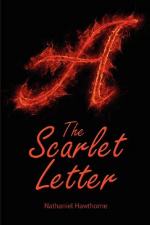“Woman, it is thy badge of shame!” replied the stern magistrate. “It is because of the stain which that letter indicates that we would transfer thy child to other hands.”
“Nevertheless,” said the mother, calmly, though growing more pale, “this badge hath taught me—it daily teaches me—it is teaching me at this moment—lessons whereof my child may be the wiser and better, albeit they can profit nothing to myself.”
“We will judge warily,” said Bellingham, “and look well what we are about to do. Good Master Wilson, I pray you, examine this Pearl—since that is her name—and see whether she hath had such Christian nurture as befits a child of her age.”
The old minister seated himself in an arm-chair and made an effort to draw Pearl betwixt his knees. But the child, unaccustomed to the touch or familiarity of any but her mother, escaped through the open window, and stood on the upper step, looking like a wild tropical bird of rich plumage, ready to take flight into the upper air. Mr. Wilson, not a little astonished at this outbreak—for he was a grandfatherly sort of personage, and usually a vast favourite with children—essayed, however, to proceed with the examination.
“Pearl,” said he, with great solemnity, “thou must take heed to instruction, that so, in due season, thou mayest wear in thy bosom the pearl of great price. Canst thou tell me, my child, who made thee?”
Now Pearl knew well enough who made her, for Hester Prynne, the daughter of a pious home, very soon after her talk with the child about her Heavenly Father, had begun to inform her of those truths which the human spirit, at whatever stage of immaturity, imbibes with such eager interest. Pearl, therefore—so large were the attainments of her three years’ lifetime—could have borne a fair examination in the New England Primer, or the first column of the Westminster Catechisms, although unacquainted with the outward form of either of those celebrated works. But that perversity, which all children have more or less of, and of which little Pearl had a tenfold portion, now, at the most inopportune moment, took thorough possession of her, and closed her lips, or impelled her to speak words amiss. After putting her finger in her mouth, with many ungracious refusals to answer good Mr. Wilson’s question, the child finally announced that she had not been made at all, but had been plucked by her mother off the bush of wild roses that grew by the prison-door.
This phantasy was probably suggested by the near proximity of the Governor’s red roses, as Pearl stood outside of the window, together with her recollection of the prison rose-bush, which she had passed in coming hither.
Old Roger Chillingworth, with a smile on his face, whispered something in the young clergyman’s ear. Hester Prynne looked at the man of skill, and even then, with her fate hanging in the balance, was startled to perceive what a change had come over his features—how much uglier they were, how his dark complexion seemed to have grown duskier, and his figure more misshapen—since the days when she had familiarly known him. She met his eyes for an instant, but was immediately constrained to give all her attention to the scene now going forward.




